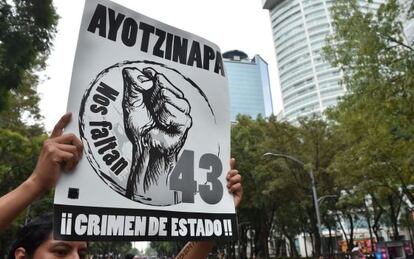US withholds funds to Mexico over human rights concerns
Washington decides not to issue certification needed to release 15% of anti-drug money


The United States has blocked some of the funding allocated to Mexico to fight drug trafficking as part of the Mérida Initiative over human rights concerns.
Although the amount is not much – 15 percent of the total – the gesture is symbolic. In order for Mexico to receive those funds, the US State Department needs to send a report to Congress attesting to the fact that the Latin American nation continues to respect human rights. A year after the disappearance of 43 students in Iguala and the massacre in Tlatlaya, Washington decided not to issue this certification, thus sending a clear message to the Enrique Peña Nieto administration.
This year, we were not able to confirm that Mexico is fully meeting the specific criteria” US State Department source
“This year, we were not able to confirm that Mexico is fully meeting the specific criteria,” a US State Department source who asked not to be named told EL PAÍS.
The Washington Post broke the news on Monday, saying that this is not the first year that the United States has withheld human rights-related funding since the signing of the Mérida Initiative in 2008. But, according to the newspaper, it does mark the first time that Mexico could lose those funds for good – on other occasions the money did end up going to the Mexican government.
Of the $148 million allocated for the Mérida Initiative this year, $5 million has been “reprogrammed” to “support the eradication of coca in Peru,” though that does not change Washington’s desire to keep “supporting the efforts of the Mexican government to protect and promote human rights and democracy,” the anonymous source said.
Although Washington has tried to take a moderate tone in its statements regarding human rights in Mexico since the beginning of the Peña Nieto administration, it has shown increasing concern over the last few months, especially in June, when the State Department published its annual report on human rights.
In the chapter on Mexico, the Barack Obama administration underscored concerns over “significant human rights-related problems,” including “police and military involvement in serious abuses.”
The report, which Mexico called “a unilateral exercise,” takes note of both the Tlatlaya massacre, where it was confirmed that Mexican soldiers took part in the cold-blooded murder of at least 15 civilians, and the Iguala case, where there are still too many unanswered questions regarding the disappearance of 43 students. But according to cables recently declassified over the last few months, these two cases have been setting off alarm bells in Washington for at least a year.
Soon after the State Department report was published, 82 American lawmakers signed a letter expressing their concerns over the state of human rights in Mexico and urging State Secretary John Kerry to “make the defense of human rights a fundamental part of our bilateral agenda with Mexico.”
A few days later in July, eight human rights organizations formally asked the Obama administration not to issue a certification saying that Mexico respects human rights and thus to withhold 15 percent of funding.
The report takes note of both the Tlatlaya massacre and the Iguala disappearances
According to one of the signatories of the petition, the Washington Office on Latin America (WOLA), this gesture “will send a clear message that the United States condemns serious violations of human rights committed in Mexico.”
The decision from the State Department comes at a delicate time. On Tuesday, the Inter-American Commission on Human Rights (IACHR) will examine the Iguala case in Washington and will review preliminary conclusions drawn by a group of international experts, which has questioned the official account of events. The organization has said its decision will take into account the executive branch’s level of commitment to implementing recommendations it has received about the way it is investigating a case that has gripped the entire nation for over a year.
English version by Dyane Jean François.
Tu suscripción se está usando en otro dispositivo
¿Quieres añadir otro usuario a tu suscripción?
Si continúas leyendo en este dispositivo, no se podrá leer en el otro.
FlechaTu suscripción se está usando en otro dispositivo y solo puedes acceder a EL PAÍS desde un dispositivo a la vez.
Si quieres compartir tu cuenta, cambia tu suscripción a la modalidad Premium, así podrás añadir otro usuario. Cada uno accederá con su propia cuenta de email, lo que os permitirá personalizar vuestra experiencia en EL PAÍS.
¿Tienes una suscripción de empresa? Accede aquí para contratar más cuentas.
En el caso de no saber quién está usando tu cuenta, te recomendamos cambiar tu contraseña aquí.
Si decides continuar compartiendo tu cuenta, este mensaje se mostrará en tu dispositivo y en el de la otra persona que está usando tu cuenta de forma indefinida, afectando a tu experiencia de lectura. Puedes consultar aquí los términos y condiciones de la suscripción digital.








































